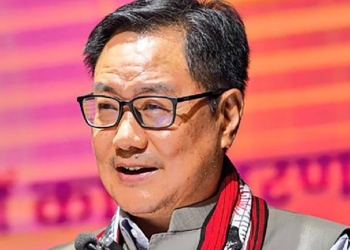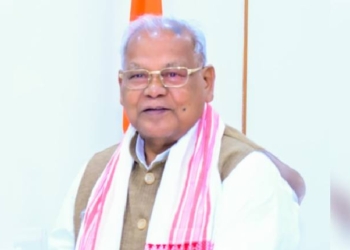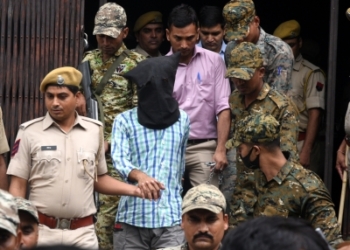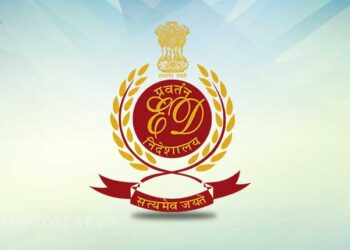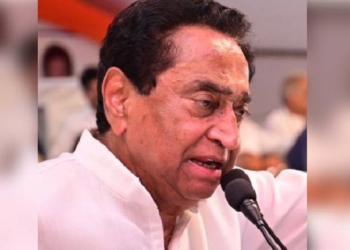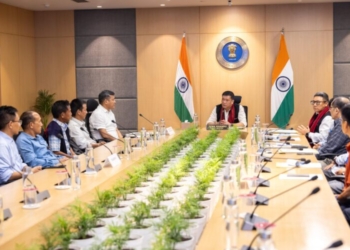New Delhi: The Supreme Court on Thursday ruled that it is ideal to hold that a democratically elected Delhi government should have control over its officers and the Lt Governor (LG) is bound by the advice of the elected government in everything other than public order, police, and land.
It stressed that if the government is not able to control and hold to account the officers posted in its service, then its responsibility towards the legislature as well as the public is diluted.
A five-judge constitution bench headed by Chief Justice D Y Chandrachud said: “The ideal conclusion would be that GNCTD (Government of National Capital Territory of Delhi) ought to have control over ‘services’, subject to exclusion of subjects which are out of its legislative domain. If services are excluded from its legislative and executive domain, the ministers and the executive who are charged with formulating policies in the territory of NCTD would be excluded from controlling the civil service officers who implement such executive decisions.”
The bench – also comprising Justices M.R. Shah, Krishna Murari, Hima Kohli, and P.S. Narasimha – observed that in a democratic form of government, the real power of administration must reside in the elected arm of the state, subject to the confines of the Constitution.
It stressed that an unaccountable and a non-responsive civil service may pose a serious problem of governance in a democracy, and creates a possibility that the permanent executive, consisting of unelected civil service officers, who play a decisive role in the implementation of government policy, may act in ways that disregard the will of the electorate.
The bench said a constitutionally entrenched and democratically elected government needs to have control over its administration and the administration comprises several public officers, who are posted in the services of a particular government, irrespective of whether or not that government was involved in their recruitment.
“For instance, an officer recruited by a particular government may serve on deputation with another government. If a democratically elected government is not provided with the power to control the officers posted within its domain, then the principle underlying the triple-chain of collective responsibility would become redundant,” said the bench.
The triple chain of command is – a: Civil service officers are accountable to ministers; b: Ministers are accountable to Parliament/legislature; and c: Parliament/legislature is accountable to the electorate.
Chief Justice Chandrachud, who authored the 105-page judgment on behalf of the bench, said: “If the government is not able to control and hold to account the officers posted in its service, then its responsibility towards the legislature as well as the public is diluted.
“The principle of collective responsibility extends to the responsibility of officers, who, in turn, report to the ministers. If the officers stop reporting to the ministers or do not abide by their directions, the entire principle of collective responsibility is affected.”
The bench said a democratically elected government can perform, only when there is an awareness on the part of officers of the consequences which may ensue if they do not perform. If the officers feel that they are insulated from the control of the elected government which they are serving, then they become unaccountable or may not show commitment towards their performance, it added.
In context of the LG, the bench said: “In light of Article 239AA and the 2018 Constitution bench judgment, the Lt Governor is bound by the aid and advice of the Council of Ministers of NCTD in relation to matters within the legislative scope of NCTD. As we have held that NCTD has legislative power over ‘services’ (excluding ‘public order’, ‘police’, and ‘land’) under Entry 41 in List II, the Lt Governor shall be bound by the decisions of GNCTD on servicesa..”.
The bench said that the legislative and executive power of NCTD over Entry 41 shall not extend over to services related to “public order”, acepolice”, and “land”.
“However, legislative and executive power over services such as Indian Administrative Services, or Joint Cadre services, which are relevant for the implementation of policies and vision of the NCTD in terms of day-to-day administration of the region shall lie with the NCTD,” it added.
The bench observed that Article 239AA, which conferred a special status to NCTD and constitutionally entrenched a representative form of government, was incorporated in the Constitution in the spirit of federalism, with the aim that the residents of the capital city must have a voice in how they are to be governed.
“If services are excluded from its legislative and executive domain, the ministers and the executive who are charged with formulating policies in the territory of NCTD would be excluded from controlling the civil service officers who implement such executive decisions,” it noted.
The top court’s judgment came over the power tussle between the Centre and the Delhi government over the control of bureaucrats in the national capital.
In May last year, when the matter was referred to a five-judge bench, the apex court clarified that the bench shall adjudicate the limited issue relating to ‘services’ in Delhi and that no other substantial issue on interpretation of Article 239AA shall be adjudicated afresh.
Article 239AA delineates the legislative and executive powers of the Delhi government while clarifying that three subjects, namely land, police, and public order, shall remain under the exclusive domain of the Centre in the capital.
(IANS)




